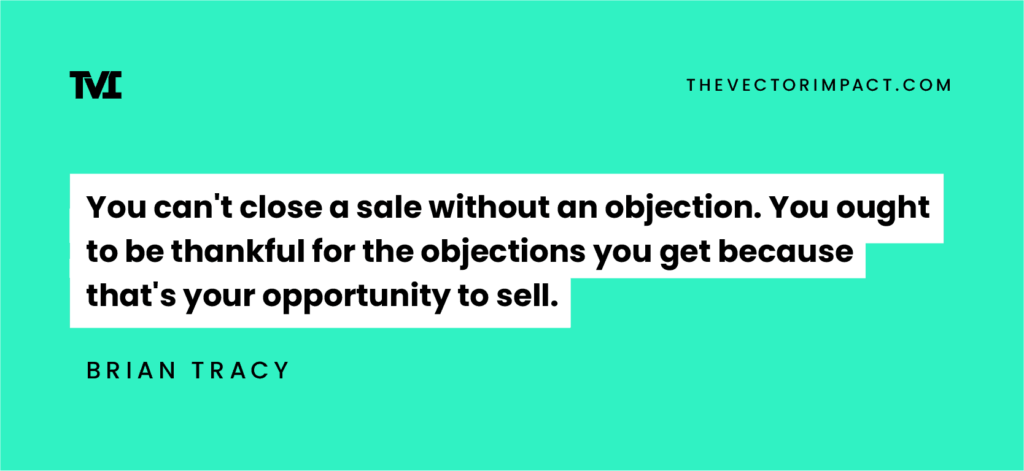Table of Contents
It was my first month on the job. I was in the middle of a sales pitch, and my confidence was through the roof. This was going to be my first sale—I could feel it.
“I actually don’t think we have a need for your product but thank you for your time.”
I froze.
My training taught me several ways to handle sales objections, but they all slipped my mind.
Should I just accept the rejection and move on?
Initially, objections left me hopeless about making the sale. It’s like I hit a wall, and there was no way to overcome it.
Other times, I wanted to keep going, but I didn’t want to pressure the customer.
I had many moments like these when I first started out in sales. But I learned from these encounters that the more “no’s” I experienced, the more comfortable I became at handling them.
And you can, too.
Keep reading for tips on how you can not only respond to sales objections but leverage them to improve your sales skills. First, it’s time to change your mindset and…
Reframe objections as opportunities
When working in sales, you’ll likely hear these common objections:
“I need some time to think about it.”
“It’s not going to work with my budget.”
“I’m not interested.”
“I don’t have the need for your product/service.”
The list goes on and on.
But here’s the thing: just because an objection is common doesn’t mean it isn’t valid.
And while some objections will end up being a firm no, others can still turn into sales if you keep the conversation going.
The key is to reframe the objection as an opportunity.
For example, take the objection, “I need to think about it.”
Instead of hearing this as a brush-off, consider that this person might actually be interested in your product or service—but they need more time to think about it.
Clarify anything the customer has questions about. Ask about their reservations and concerns, and address them. Give them the information they’ll need to feel confident about making the purchase.
Also, avoid getting defensive or reactive when faced with sales objections.
Instead of taking things personally, try to put yourself in your customer’s shoes and consider their perspective.
Sometimes it’s as simple as asking “Why?”—as entrepreneur Jia Jiang found in his social experiment of “100 days of rejection.”
Luckily you don’t have to ask a stranger for $100 like Jia (awkward). But you may have to address your customer’s concern that your product is too expensive.
Instead of viewing this as an outright rejection, view it as an opportunity to showcase the value of your product or service.
Now’s your chance to share the features, benefits, and how much money the customer can save in the long run (as opposed to buying from a cheaper competitor).
Reframing sales objections is about being creative, thoughtful, and responsive to your customers’ needs and concerns.
Use social proof
If you’ve ever bought a product based on online reviews, an influencer’s review, or a friend’s recommendation, you’ve experienced the persuasive power of social proof.

Social proof is when we take others’ thoughts or opinions on something and use them to inform our own decision. When purchasing something, we want to know we’re making a good choice. We feel more confident about our purchase if we know someone who’s had a great experience with a product or service.
So, how can you use social proof when handling customer objections in your sales presentation?
Don’t underestimate the power of stories. Real-life satisfied customers speak loudly for your product or service.
There are a few ways you can approach this:
- Share case studies.
- Talk about good reviews from other customers.
- For referrals, mention the person that referred them and their experience with the product/service.
- Tell a story of how someone overcame a similar challenge or problem using your product/service.
- Talk about how your product or service changed a customer’s life or business for the better.
- Share your personal experience with the product or service. How has it impacted you?
Let’s say you’re trying to sell a product or service that will allow people to save money on their energy bills. Using testimonials from past customers who were able to significantly reduce their utility costs will make people more receptive to your offer.
Personally, I’m a sucker for social proof. If I’m skeptical about a product, but it has great reviews, or I know someone who has the product, nine times out of 10 I’ll be buying it.
There’s an influencer I follow on social media who started promoting supplements for healthy skin. I first saw these vitamins on an Instagram ad. I considered them, but I wasn’t entirely sold.
Later, more influencers I followed were also talking about the same product. I learned more, read the reviews, and ended up purchasing the vitamins. I love them, and they’re now part of my daily routine—all because of social proof.
Demonstrate your product
Think about this for a second. What would be more impactful—having someone talk about a product or having someone show you a product and how it works?
Of course, it’s essential to discuss your product and its benefits with your customers.
But this leaves room for hesitation. Maybe the customer can’t fully understand how your product works based on words alone. Or they can’t imagine themselves using the product.
Start out by highlighting the benefits, focusing on your product’s strengths, and how it solves common problems for its users.
Then, take it one step further and actually showcase the product.
Depending on what you’re selling, the customer may need to experience using it for themselves.
For example, if you’re selling an iPhone, let them hold it, play around, and check out its many features. Or if they want to buy a piece of furniture, let them sit on it and test out how it feels.
If it’s not possible for the customer to try it, show them how to use the product through a quick demonstration. This way, they still get to visualize using the product even if they can’t personally try before they buy.
By incorporating a product demonstration or letting your customer test it, you can overcome objections and hesitations. You’re taking it from a concept to reality.
Ask open-ended questions…and really listen
Asking the right kinds of questions, specifically open-ended ones, can help you overcome sales objections more effectively.
Questions get your prospects thinking and allow them to articulate their objections without feeling pressured or trapped.
For example, if a customer says your product is too expensive, ask them what features are most important.
By opening up the conversation, you give yourself the chance to show them why your product is worth the price.
Similarly, if a customer expresses concern about your company’s reputation or reliability, ask for specific examples of when your products have failed in the past. Or ask how they heard about your company.
Maybe their source wasn’t reliable, or they were misinformed. Take this time to be honest about the brand and what the customer can really expect.
Or perhaps the customer says, “I just need some time to think about it.”
Ask them what’s causing their hesitation and if they have any questions.
By listening to their concerns and addressing them head-on with thoughtful questioning, you can turn even the most reluctant customers into loyal advocates for your brand.
Stay positive
Positivity is one of the most powerful tools you have at your disposal for overcoming sales objections.
When faced with a hurdle, it’s easy to get caught in a loop of negative feelings and self-doubt. By taking an optimistic approach, you can breathe new energy into your situation and push through objections.
Positivity will help you think creatively about the issue at hand. With an open-minded attitude, you’ll be able to identify new solutions to your customer’s objections that may not have occurred to you before.
Additionally, positivity strengthens your resolve and gives you the motivation to power through obstacles.
In my personal sales experience, choosing this mindset wasn’t easy.
Getting no after no really tanked my mood for the day, and I’d lose all motivation.
I wouldn’t ask any additional questions or use my skills to try to overcome the objection. I didn’t want to be pushy, and I didn’t feel confident about how to move forward.
But as time went on, I learned to embrace the “no’s” and use them as opportunities to grow. By shifting to a more positive mindset about sales objections, they became easier to navigate when they (inevitably) came up.
Objections are simply redirections

I learned to accept that sometimes people will say no, no matter what you do. And that’s okay.
What makes you successful in sales is what you do with every “no.”
Remember, objections aren’t rejection. They’re just redirection.
When you understand where a customer is coming from and offer them a path forward that fits their needs, you’ve won half the battle.


